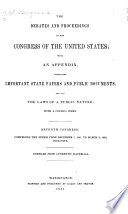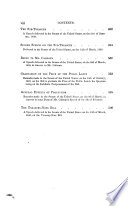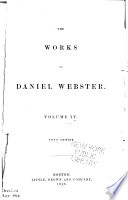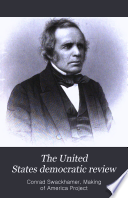 The first section of the third article of the constitution declares that "the judicial power of the United States shall be vested in one supreme court, and such inferior courts as congress may, from time to time, ordain and establish. The first section of the third article of the constitution declares that "the judicial power of the United States shall be vested in one supreme court, and such inferior courts as congress may, from time to time, ordain and establish.  Political Science Quarterly - Page 3991908Full view Political Science Quarterly - Page 3991908Full view - About this book
 | United States. Congress - 1851 - 716 pages
...Congress on this law. The first section of the third article vests the judicial power of the United States in one Supreme Court and such inferior courts as Congress may, from time to time, ordain and establish. By this clause Congress may} from time to time, establish inferior courts ; but it is... | |
 | John Caldwell Calhoun - 1851 - 428 pages
...powers between the two co-ordinate governments. The judicial power of the United States is vested in the Supreme Court, and such inferior courts as Congress may, from time to time, ordain and establish. The judges hold their offices during good behavior ; and have a fixed salary which can... | |
 | Daniel Webster - 1851 - 580 pages
...qualified negative over all acts of Congress. So the Constitution declares that the judicial power shall be vested in one Supreme Court, and such inferior courts as Congress may establish. It gives, nevertheless, in another provision, judicial power to the Senate ; and, in like... | |
 | John Caldwell Calhoun - 1851 - 462 pages
...if he had signed it ; unless Congress, by its adjournment, prevent its return. The judicial power is vested in one Supreme Court, and such inferior courts, as Congress may establish. The Judges of both are appointed by the President in the manner above stated; and hold their... | |
 | United States. Congress - 1851 - 722 pages
...ordain and establish." What says the Constitution ? " The Judicial power of the United States shall be vested in one Supreme Court, and such inferior courts. as Congress shall from time to time ordain and establish." Congress may. then, or Congress may not from time to... | |
 | John Caldwell Calhoun - 1851 - 436 pages
...if he had signed it; unless Congress, by its adjournment, prevent its return. The judicial power is vested in one Supreme Court, and such inferior courts, as Congress may establish. The Judges of both are appointed by the President in the manner above stated; and hold their... | |
 | Asa Kinne - 1852 - 736 pages
...of the constitution, of which sec. 1st declares that the judicial power of the United States shall be vested in one supreme court, and such inferior courts as Congress may, from time to time, ordain and establish. By section 2d, it is declared that the judicial power shall extend to all cases in law... | |
 | Daniel Webster - 1853 - 578 pages
...qualified negative over all acts of Congress. So the Constitution declares that the judicial power shall be vested in one Supreme Court, and such inferior courts as Congress may establish. It gives, nevertheless, in another provision, judicial power to the Senate ; and, in like... | |
 | 1855 - 560 pages
...State Legislatures and to the people of the States. " The judicial po\ver of the United States shall be vested in one Supreme Court and such inferior courts as Congress may, from time to time, ordain and establish;" Congress, therefore, is the agent whereby these courts are established. What is Congress?... | |
 | Cornelius S. Cartee - 1855 - 348 pages
...Vice President is the presiding officer of the Senate. The Judiciary power of the United States is vested in one Supreme Court, and such inferior courts as Congress may, from time to time, establish. The judges are nominated by the President, approved by the Senate, and hold... | |
| |